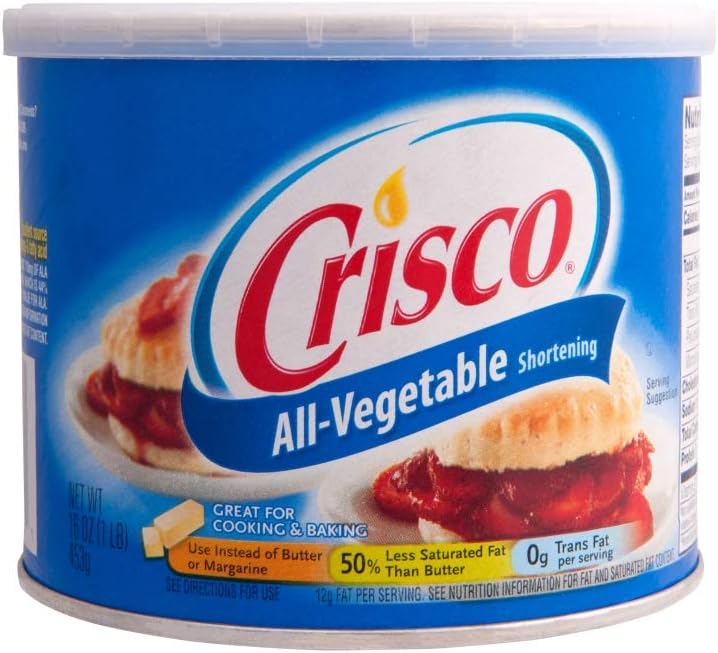Crisco Shortning 453g
- Brand: Unbranded

Description
Based on availability, affordability, effectiveness, and having a high smoke point, Lodge recommends vegetable oil, melted shortening, or canola oil.”
Haha, that post got very off topic. Sorry, went on a bit of a rant there! If anyone knows where I can get that stuff in London let me know!! I know there is a shop that sells Canadian products near Coven Garden, but I've heard it's very expensive. When a recipe calls for it, is Crisco the only option? What else can you use for shortening? Are there alternatives that are healthier or lend a richer flavor?
I’m listing avocado oil FIRST, because it is the best oil for seasoning cast iron, in my opinion! Just be sure to look for a refined avocado oil, because the smoke point will be much higher (around 500-520 degrees) than an unrefined version. Coconut oil is a healthy alternative to Crisco that has some nutritional benefits. It is derived from mature coconut meat and has a mild nutty flavor.
Coconut oil is another excellent substitute for Crisco. Unlike butter, if you are substituting coconut oil for Crisco, there is no need to change the quantity. Coconut oil has a very different flavor to Crisco, so ensure that a coconut flavor will complement your recipe. I basically just rubbed the paper towel with residual flaxseed oil all over the pan again and again, rub, smoke repeat until the paper towel fell apart.
We suggest that you experiment with butter before making your desired dish. Try substituting half the Crisco for butter the next time you make something, and see how this changes the texture of your dish. You don’t want the food that you are cooking in your cast iron skillet to take on the flavor of the oil you used for seasoning, so look for an oil that is neutral in flavor. How to watch Love Island Games in the UK: As the spin-off to the popular dating show lands, UK viewers need to know how to view it. Unlike butter, lard is great for deep frying. The low water content in the lard will result in little splattering and smoking when you are cooking.
Some nutritionists [ who?] argue that while the formula has been changed to remove the trans fatty acids, the fully hydrogenated oil used to replace them may not be good for health. Crisco and similar low-trans fat products are formed by the interesterification of a mixture of fully hydrogenated oils and partially hydrogenated oils. The composition of the resultant triglycerides is random, and may contain combinations of fatty acids not commonly found in nature. [9] [10] A recent study showed that interesterified fat increased volunteers' blood sugar by 20%, while simultaneously lowering the body's HDL cholesterol. [11] Kream Krisp [ edit ] Kream Krisp logo Hello, I used Dawn for my first wash of my new pre seasoned cast iron. I’m in the process of seasoning now and just wonder if Dawn was too gentle for my first wash? I used my chain scrubber and Dawn.
So, as you can see, the general consensus is grape seed oil, but overall the smoke point of the oil and the types of fats they contain are the most important factor when choosing the best oil for seasoning cast iron. You can go here to read more about different cooking oils and their smoke points. The BEST Oil for Seasoning Cast Iron – My Favorites! Avocado Oil
In conclusion, oil and cast iron cookware go together like peanut butter and jelly… you can’t have one without the other. And since selecting the right oil is such an important part of the cast iron seasoning process, you need to do your research. There are 4 main cast iron cookware manufacturers, and their recommendations for the best oil to season cast iron are pretty similar. Let’s take a look: Cast Iron Manufacturer Alex Renton (September 27, 2006). "Alex Renton investigates the health risks of trans fats: Grease is the word". The Guardian.
Unfortunately, there are some foods that you just can’t get in the UK. You might be able to buy them online for an added cost but here is a list of some popular products:
- Fruugo ID: 258392218-563234582
- EAN: 764486781913
-
Sold by: Fruugo
